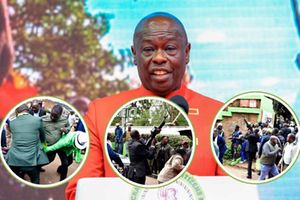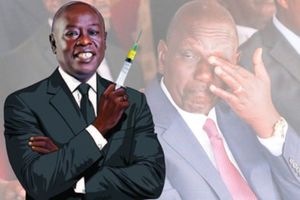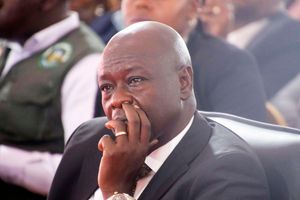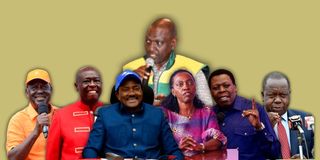
President William Ruto (top). From left: Raila Odinga (ODM), Rigathi Gachagua (DCP), Kalonzo Musyoka (Wiper), Martha Karua (PLP), Eugene Wamalwa (DAP-Kenya) and former Interior CS Fred Matiang’i.
Kenya’s political landscape is witnessing a familiar shift as regional parties and ethnic kingpins re-emerge ahead of the 2027 General Election.
The resurgence signals a steady retreat from national coalitions back to identity-driven politics to mobilize regional bases, ahead of the next election.
In a country where politics often dances to the rhythm of ethnic allegiance, the return of regional parties and their tribal kingpins is hardly surprising.
In what appears to be a significant political realignment ahead of the 2027 General Election, former Deputy President Rigathi Gachagua on Thursday launched the Democracy for the Citizens Party (DCP) with an eye on his Mt Kenya backyard before he launches drives to give the party a national footing.
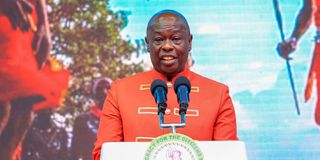
Former Deputy President Rigathi Gachagua makes his address during the unveiling ceremony of Democracy for the Citizens Party (DCP) in Lavington, Nairobi on May 15, 2025.
Even though the party’s interim officials reflect national outlook, insiders believe the former DP’s strategy is to first drive out President William Ruto’s United Democratic Alliance (UDA) from Mt Kenya region before he sets out for a national coalition with other opposition partners.
Mr Gachagua, Wiper leader Kalonzo Musyoka, ex- Interior Cabinet Secretary Fred Matiang’i, People’s Liberation Party chief Martha Karua, former president Uhuru Kenyatta’s Jubilee, Eugene Wamalwa’s DAP-Kenya among other leaders, have been crafting what they have termed as a Narc-like coalition to send President Ruto home.
Before that, they have vowed to set out to mobilize their bases ahead of the major announcement next year.
Frustrated by what insiders say is marginalization within the UDA party hierarchy, Mr Gachagua has turned to the familiar terrain of regional kingpin politics to consolidate his influence in Central Kenya, where President Ruto’s support appears increasingly shaky.
The move mirrors similar steps by other political heavyweights who are reclaiming or reviving parties that reflect their community roots.
Just as the Amani National Congress (ANC) party associated with Prime Cabinet Secretary Musalia Mudavadi was folded, his former allies ganged up to launch Democratic National Alliance (DNA), which they noted would fill the void left following the ANC merger with UDA.
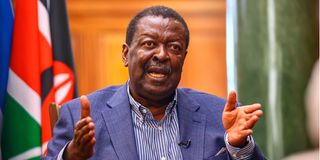
Prime Cabinet Secretary and Cabinet Secretary for Foreign and Diaspora Affairs Musalia Mudavadi during an interview at his office in Nairobi on January 18, 2025.
“ANC party was folded and they never cared about members. They never asked us if we wanted to join UDA, but just chose to go ahead with their plans and dissolved, so where do we go to? Just stay without a home?” DNA party leader Godfrey Kanoti said during the launch of the outfit.
“What we are doing is to give our members across the nation a chance and a home after the dissolution of ANC party,” the party leader said.
Mr Musyoka, whose Wiper party is predominantly in the Lower Eastern has also announced plans to rebrand the outfit to give it a fresh impetus ahead of the elections.
Nearly all the major political parties are linked to communities; with the ruling UDA, after disintegration in Mt Kenya being predominant in the Rift Valley.
While Raila Odinga’s ODM enjoys wide support in Western and Coast, it is also predominant in Nyanza region.
Siaya Senator Dr Oburu Oginga agrees that most political parties have their strongholds where their influence cannot be questioned.

ODM leader Raila Odinga.
“The strongholds are well known. I don’t expect anyone to come and ask me where the strongholds are because they are known,” Dr Oginga said as he explained that ODM-UDA cooperation did not envisage inter-stronghold competition in the upcoming byelections to “save resources.”
National Assembly Speaker Moses Wetang’ula’s Ford Kenya as well as Mr Wamalwa’s DAP-Kenya both have their roots in Western Kenya, with Mr Wetang’ula’s outfit being deeply rooted in Bungoma while Mr Wamalwa’s in Trans Nzoia counties.
Ford Kenya party has shunned attempts by UDA to have it fold, with the party leadership insisting that “the party being the second oldest in the country, will not fold or merge with any other party.”
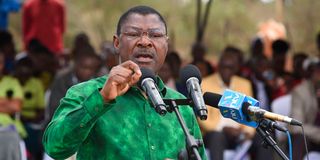
National Assembly Speaker Moses Wetang'ula.
“Members have discussed at length the issues of dissolution and merger with another party as the matter has been in public domain. They came to a conclusion that the party cannot and will not merge or dissolve to join another party. The members are of the views, as adopted by the National Executive Committee meeting that we can only strengthen and build the capacity of the party,” Ford Kenya Secretary General John Chikati said.
He said that the party will compete with other parties as rivals.
He added that even as they work with President Ruto’s UDA, the party has to keep its identity.
The rise of regionalism is also reviving fears of ethnic polarization.
Critics argue that the trend could roll back gains made in building national unity through broad-based coalitions.
While most of the major parties are regionally anchored, their leaders are however, not ruling out coalitions.
Observers are closely watching how the Independent Electoral and Boundaries Commission (IEBC) and the Registrar of Political Parties will handle this explosion of activity.
Dozens of new parties are being registered or reactivated, raising questions about political funding, candidate vetting, and coalition-building rules.
As Kenya enters the 2027 election cycle, the return of regional parties is setting the stage for a high-stakes showdown between national ambitions and local loyalties.
Whether this trend will deepen democracy or divide the country remains to be seen.
But one thing is clear — the political battleground is shifting, and the age of the regional kingpin is far from over, analysts say.
Prof Gitile Naituli of Multi Media University says that president Ruto faces a complex and narrowing path to re-election in 2027 following the emergence of these parties and their resolve to join hands in a larger coalition.
“While incumbency gives him certain structural advantages—state machinery, visibility, and resources—there are several significant stumbling blocks that could undermine his bid if not addressed deftly and strategically,” the professor of management and governance says.
Prof Naituli argues that: “The Gachagua ouster and fragmentation of Mt Kenya politics have shaken a critical pillar of Ruto’s 2022 victory. The region’s historical expectation of political reciprocity and economic empowerment remains unmet. Discontent over stalled development promises, youth unemployment, and perceptions of betrayal could dent turnout or push the bloc toward neutrality or even opposition.”
On Thursday, Mr Gachagua described his newly launched party as the answer to many issues raised by Kenyans, including ‘punitive taxation, poor public service delivery, skyrocketing cost of living, poor healthcare, bad policies, poor governance, insecurity and pathological lies, among others.’
"Our message is clear: the people of Kenya have unfinished business with you. We have a date with you in August 2027. We have not forgotten what you did to our economy or to our young men and women in June 2024," he said.
"We have not forgotten the countless lies and empty promises you make to us every day. We have not forgotten. We shall remind you in August 2027.”

